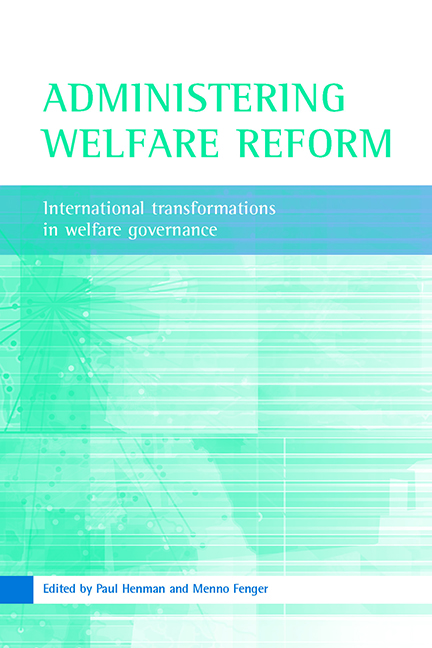Book contents
- Frontmatter
- Contents
- List of tables
- Preface
- Acknowledgements
- List of abbreviations
- Notes on contributors
- one Introduction: administering welfare reform
- two Welfare reform as governance reform: the prospects of a governmentality perspective
- Part One Participants: reforming the agents of welfare delivery
- Part Two Practices: the welfare governance of street-level practices
- Part Three Processes: the changing spaces of welfare governance
- Index
- Also available from The Policy Press
three - State–third sector partnership frameworks: from administration to participation
Published online by Cambridge University Press: 14 January 2022
- Frontmatter
- Contents
- List of tables
- Preface
- Acknowledgements
- List of abbreviations
- Notes on contributors
- one Introduction: administering welfare reform
- two Welfare reform as governance reform: the prospects of a governmentality perspective
- Part One Participants: reforming the agents of welfare delivery
- Part Two Practices: the welfare governance of street-level practices
- Part Three Processes: the changing spaces of welfare governance
- Index
- Also available from The Policy Press
Summary
Since the end of the last century, throughout much of the world, institutional relations between welfare states and the third sector, otherwise known as the voluntary and community sector, have been undergoing a multifaceted transformation. One apparent sign of change has been the signing of formal, national ‘partnership’ agreements or policies, to regularise relations between governments and third sectors. Non-governmental, non-profit, voluntary or grassroots organisations have always played significant roles in most welfare states. However, in the past, they tended to occupy fragmented or unrelated social spaces, only partially and unevenly regulated by the state; their relations with governments and public organisations tended to be ad hoc; and their role in the welfare state was largely invisible. As deliverers of public services, they were generally not distinguished from public sector organisations. As providers of charity, they represented the absence, failure or weakness of the welfare state, or a vestige of pre-welfare state institutions. Analysts of the welfare state studiously ignored them.
In 1997, something new happened: Tony Blair, newly elected Prime Minister of the UK, came to power promoting a new view of ‘Third Way’ welfare state governance. One of his first acts was to mandate the development of a series of ‘Compacts’ to be signed between the governments of England, Scotland, Wales and Northern Ireland and their respective voluntary and community sectors. The Compacts, signed in 1998, officially recognised the ‘voluntary and community sector’, formally defined and described it, designated it a ‘partner’ of government, and drew up a set of principles to govern the relations between the two parties. Oddly, this formula quickly spread to other countries with very different governments, different traditions of governance, and very different histories of civil society organisation. The British template has inspired agreements either signed or under consideration in at least 14 other jurisdictions, including Estonia, Germany, New Zealand and Spain (Phillips, 2002). Canada and France both signed similar accords in 2001 (Government of Canada and Voluntary Sector, 2001; Premier Ministre et CPCA, 2001). The Canadian province of Québec, as well as Wales, has adopted government policies that cover much the same ground, but are actually more binding on government than the original Compact-style agreements.
This international rash of activity, and the surprising similarities and differences between the various ‘partnership frameworks’ that have been devised, urge us to carefully consider their significance for the sector and for societies in general.
- Type
- Chapter
- Information
- Administering Welfare ReformInternational Transformations in Welfare Governance, pp. 45 - 72Publisher: Bristol University PressPrint publication year: 2006
- 1
- Cited by



